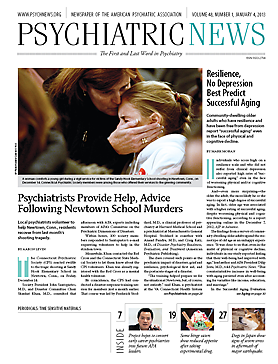Psychotic symptoms are strongly associated with increased risk for suicidal behavior in the general adolescent population and in adolescents with nonpsychotic psychiatric disorders, according to a report of two independently conducted case-control clinical interview studies from Ireland.
In both studies, an absolute majority of adolescents with more severe suicidal behavior (including ideation, suicidal plans and acts) reported psychotic symptoms when directly questioned about this as part of a psychiatric interview.
The report was published in the December 2012 Archives of General Psychiatry.
“The immediate clinical relevance of these findings is that all patients presenting at risk for suicidal behavior should receive a thorough assessment of psychotic symptoms and not just a screening to rule out psychotic disorder,” write Ian Kelleher, Ph.D., and colleagues at the Royal College of Surgeons in Ireland. “Research has shown that the largest increase in suicide risk in the general population occurs after there has already been contact with mental health services and that approximately half of patients who complete suicide have contact with primary care providers in the month preceding their death.”
The two independently conducted case-control clinical interview studies included one with 212 adolescents aged 11 to 13 and a second with 211 adolescents aged 13 to 15.
Participants were recruited from schools, and suicidal behavior and psychotic symptoms were assessed by semi-structured diagnostic clinical interview.
The researchers found that psychotic symptoms were associated with a 10-fold increased odds of any suicidal behavior (including ideation, plans, or acts) in both the early- and middle-adolescence studies.
Adolescents with depressive disorders who also experienced psychotic symptoms were at a nearly 14-fold increased odds of more severe suicidal behavior (suicide plans and suicide acts) compared with adolescents with depressive disorders who did not experience psychotic symptoms. Among all adolescents with suicidal ideation, those who also reported psychotic symptoms had a nearly 20-fold increased odds of suicide plans and suicide acts compared with adolescents with suicidal ideation who did not report psychotic symptoms.
The researchers suggest several possible explanations as to the mechanisms underlying the strong relationship between psychotic symptoms and suicidal behavior. “The most obvious is that hallucinations may direct the individual to harm or kill themselves,” they wrote. “In fact, a post hoc analysis of the type of psychotic symptoms reported by adolescents with suicidal behavior demonstrated that all included auditory hallucinations. However, only one of the participants in either of the studies reported command hallucinations to harm or kill themselves. It is possible, however, that psychotic symptoms may impact suicidal behavior via indirect cognitive mechanisms. Changes in the subjective sense of self, for example, are among the earliest recognizable symptoms of psychosis, and a sense of disintegration and fragmentation of the self resulting from intrusive voices or thoughts has been linked to suicidal thinking.” ■
